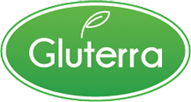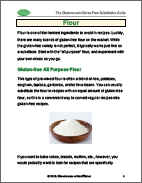Submitted by Andrew on February 2, 2013
 You may be new to the words gluten and gluten-free like I was four years ago, so here's a quick little primer on the terms and some of the issues surrounding them.
You may be new to the words gluten and gluten-free like I was four years ago, so here's a quick little primer on the terms and some of the issues surrounding them.
What is gluten?
Gluten (from Latin gluten, "glue") is a protein composite found in foods processed from wheat and related grain species, including barley and rye. Gluten gives elasticity to dough, helping it rise and keep its shape and often gives the final product a chewy texture. Wikipedia Definition
In addition, even though other grains like oatmeal do not contain gluten, some of them are processed in facilities that contain gluten and via cross-contamination, are not considered gluten-free.
Also, Gluten is used quite often in processed foods as a thickening agent so it can be in a lot of unsuspecting foods like soy sauce, many restaurant sauces, ketchup, ice cream, and many many more. We have a link to a list of GF foods below.
What is gluten-sensitivity?
Gluten sensitivity (also gluten intolerance) is a spectrum of disorders, including celiac disease and wheat allergy, in which gluten has an adverse effect on the body. Idiopathic gluten sensitivity can be defined as a non-allergic and non-autoimmune condition in which the consumption of gluten can lead to symptoms similar to those observed in celiac disease or wheat allergy (other conditions which fall under the gluten-related disorders spectrum. Wikipedia Definition
What are the symptoms of gluten-sensitivity?
Some of the symptoms of gluten sensitivity include stomach upset, bloating, abdominal pain or discomfort, gas, and diarrhea. There can be some other extenuating pains too, like muscle and joint pain.
Before I knew I was gluten intolerant, I would go out to dinner with the wife and have a beer. Then later in the evening I would start having digestive problems. I thought I might be allergic to yeast in the beer or even some food I had eaten, but had no clue about gluten intolerance at that time. My allergy symptoms remained an odd correlation that I didn't think much about. When I received my diagnosis of "leaky gut", it all started making sense. I'll discuss "leaky gut" in another article since it can be the reason for so many of us to become gluten-sensitive.
What is Celiac disease?
Celiac disease is a chronic inflammatory disorder of the small intestine in genetically susceptible individuals. It is triggered by ingesting certain proteins, commonly referred to as "gluten" which is naturally present in some cereal grains - specifically wheat, barley, rye, kamut, spelt, and triticale.
A part of the protein gluten in these specific grains combines with an immune system molecule (normally DQ2 or DQ8, thought the process is not 100% understood), producing an immune reaction that attacks the intestine itself, and can lead to an extremely large variety of symptoms, including pain, diarrhea, fatigue, and poor absorption of nutrients. Over time, damage to the intestine can lead to severe infections, osteoporosis, internal bleeding, and cancer of the intestine.
Sufferers of Celical (or Coeliac) disease have to be extremely careful what they eat, as the majority of prepared and restaurant food contains or is contaminated with the specific glutens that cause the reaction. A miniscule, invisible amount of wheat flour can trigger the process.
The types of food and levels of contamination are widely understood, and many sufferers simply avoid all food prepared by others permanently.
Approximately 1.3% of the population suffers from Celiac disease, up to 5% may be intolerant to gluten in a less serious way.
Celiac disease is a common illness for which there is no cure, and affects people of all ages. With this disease, you cannot eat wheat, rye, barley, and gluten, among other foods. This disease affects the villi in the intestines. This may not show symptoms in some people, but may in others, such as diarrhea, constipation, sickness, ulcers of the mouth, and stomach ache. Wiki Answers on Celiac
Is there a list of Gluten-free foods?
Yes, see our list to make your shopping list. View the list
Why is Gluten becoming more mainstream in the media?
As one article put it, "Gluten-free is what low carb was a decade ago."
My view is that more people are becoming gluten-intolerant and discovering they have celiac because the tests are getting much better and the information is more widespread because of the Internet. Doctors are also getting on board and realizing that some people have major issues with gluten.
Becoming gluten-free also means, at least partially, cutting out processed carbs like breads and pasta. Since it is a great way to get rid of empty calories in your diet, it might be considered a healthier diet in the media. I say "might be" because it may not be considered healthy if you have figured out how to substitute bad carbs with gluten-free bad carbs like I have. Once you've figured that out, you can get back into your bad eating habits pretty quickly.
So if you need to avoid gluten I would suggest becoming an avid label reader, using our site as a resource (of course!), and avoiding most sauces unless you see the ingredients list or speak with the chef at a restaurant to make sure.
A small amount of gluten may not affect you if you simply have an intolerance to gluten but if you are severe, in the case of celiac disease, then processed foods that do not explicitly say they are gluten-free should be completely avoided for life.
I hope this has been helpful for those of you new to this lifestyle or just curious about this lifestyle, and please let us know how we can be a better resource for you.
Find your gluten-free happiness
- Login to post comments


 Click here to get a FREE GF Substitution Guide!
Click here to get a FREE GF Substitution Guide! 
 Sign-up to become a part of our gluten-free community. As a gift for being a free member, you can download our Gluten-Free Substitution Guide -- over 40 pages of great gluten-free substitutes. As a member, we will also send you our latest updates, recipes, and special offers. We'll try not to bug you and we won't share your info.
Sign-up to become a part of our gluten-free community. As a gift for being a free member, you can download our Gluten-Free Substitution Guide -- over 40 pages of great gluten-free substitutes. As a member, we will also send you our latest updates, recipes, and special offers. We'll try not to bug you and we won't share your info.